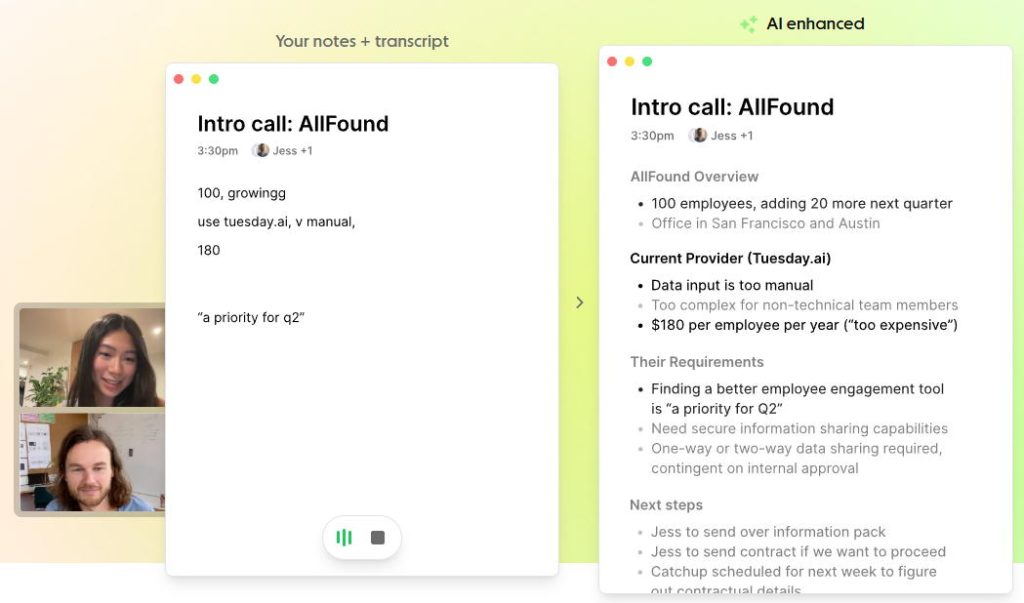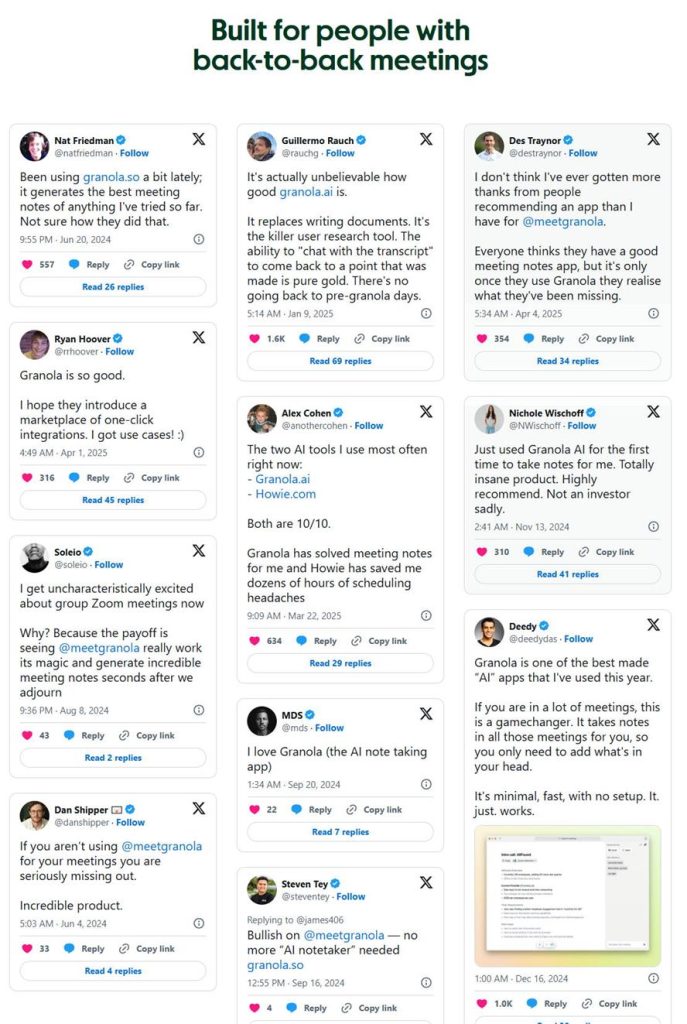Granola: How This AI Note-Taking App Achieved a $250M Valuation by Rethinking Productivity
In the rapidly evolving AI productivity tools landscape, where countless apps compete to automate our workflows, Granola has emerged as a standout success. With a staggering 70% monthly retention rate and a recent $43 million Series B funding round, the app is now valued at $250 million—a remarkable achievement for a product barely one year old.
But what makes Granola different from the dozens of AI-powered note-taking apps that preceded it?
This article takes a closer look at Granola’s design philosophy, strategic evolution, and the product decisions that allowed it to resonate so deeply with its users—many of whom are top executives from companies like Vercel, Ramp, and Roblox.
A Human-Centric Approach: Granola as Your “Second Brain”
While traditional AI note apps tend to either automate transcription or summarize meetings without user input, Granola breaks from the mold. Its core belief: AI should enhance human capability, not replace it.

Rather than hijack the note-taking process, Granola provides a flexible workspace. During meetings, users are free to jot down quick thoughts or keywords, while Granola simultaneously listens, transcribes, and later contextualizes those notes using AI.
Imagine typing just a number during a meeting, and Granola auto-links it with relevant spoken context—creating a richer, more intelligent note afterward.
This hybrid approach allows users to stay focused on insight and decision-making, while the AI takes care of the structural legwork.
Two Key Benefits of Granola’s Design:
- Contextual Understanding: By capturing low-fidelity notes from the user, Granola infers intent directly from the source rather than relying on rigid, automated summaries. This enables more user-aligned prioritization and nuance.
- Realistic Workflows: In real-world meetings, few people write detailed notes in real time. Granola embraces this imperfection. It doesn’t push users to change how they work—instead, it adapts to their messy habits, then enhances the outcome.
This approach connects with users on a personal level. As one user put it:
“Granola didn’t ask me to change how I take notes. It understood my chaotic process and made it better. It felt like it was built just for me.”
The founder, Chris Pedregal, describes Granola not as a tool, but as a cognitive extension—a sort of external memory drive for your brain. The goal? Let AI handle the repetitive and low-value tasks, while humans retain judgment, context, and creativity.
From Note-Taking to Collaboration: Evolving into a Team Knowledge Hub
Granola's latest update—version 2.0—signals a shift from personal productivity to team collaboration. The reasoning is strategic: meetings are rich in unstructured, often-ephemeral knowledge, and they represent an ideal entry point for AI.
By focusing on meetings, Granola addresses two key aspects:
- Alignment with LLM strengths (e.g., summarization, contextual extraction)
- Natural integration into workflows, especially where knowledge is shared verbally
Privacy-First Design: A Trustworthy AI Companion
In an era of increasing data concerns, Granola has prioritized security and privacy. While it transcribes meetings in real-time, it does not store audio recordings—a major contrast to other tools that capture and archive full audio/video sessions.
This choice improves trust and aligns with its human-centric design: listen, assist, but don’t intrude.

Key Collaboration Features in Granola 2.0
As Granola evolves into a collaborative knowledge platform, it introduces several powerful features:
- Shared Team Folders: Centralized hubs for calls, feedback, hiring loops, and syncs—accessible to all team members, even without a Granola account.
- Chat With Folders: AI lets you query across meetings using high-level reasoning, citing specific transcripts as references.
- Enterprise Visibility: Business users can explore domain-wide public folders—ideal for onboarding, competitive research, and customer support.
- Slack Integration: Receive meeting summaries and interact with notes directly from Slack channels—seamlessly integrated into daily operations.
These features position Granola as not just a transcription tool, but a collective intelligence layer across organizations.
Want to explore more AI tools for collaboration? Visit the Productivity & Workflow section on AI-Kit for curated picks.
Lessons from Granola: Four Principles for Building AI-First Products
Founder Chris Pedregal has shared his framework for navigating AI product development in a fast-changing landscape. His experience building Granola reveals four crucial insights:
1. Don’t Solve Problems That Will Soon Disappear
AI evolves fast. Some technical problems—like context length limitations—are solved with each new model release. Don’t waste cycles fixing things that won’t exist in 3 months.
Early Granola couldn’t handle 30+ minute meetings due to DaVinci’s 4000-token limit. Instead of fixing that, the team focused on note quality—a decision that proved far more impactful.
2. Marginal Cost Is the New Competitive Edge
Unlike traditional SaaS, AI apps carry usage costs. Every user interaction costs compute, which makes indiscriminate scale unsustainable.
This opens doors for niche, high-impact AI tools that serve smaller, more targeted audiences with exceptional depth.
3. Context is Everything
Treat the model like a smart intern: give it enough context to interpret your intent. Success in AI often depends not on prompts, but on how well you frame the background.
This insight ties into prompt engineering, which we explore in our article on Effective Prompt Design.
4. Go Narrow, Go Deep
Generic AI assistants are great—but specialized tools win when the task is frequent and precision matters. Focus on a specific use case, refine it obsessively, and solve for real-world complexity.
For example: real-time meeting alerts, echo cancellation, and note length tuning—none of these can be outsourced to a general model.
Why Granola Matters in the Future of Work
Granola exemplifies a new wave of AI-native tools that are not just “wrappers” around models, but thoughtfully designed products solving specific, high-value problems in real-world workflows.
By giving users control, transparency, and relevance, Granola taps into a deep need: tools that work the way we do, not the other way around.
Want more tools like Granola? Explore our growing directory of AI note-taking and team collaboration AI tools on AI-Kit.